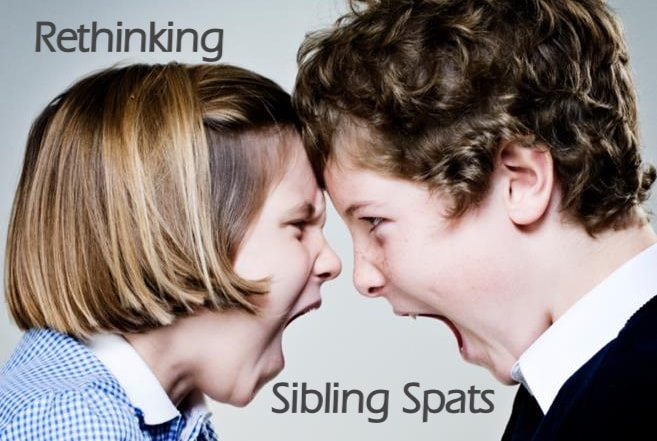|
“I had it first!!”
“He started it!!” “Stop touching me! MOMMMMM!! She won’t leave me alone!” Sound familiar? Not much gets under the skin of parents quicker than the sounds of children fighting. Sibling conflict often tops the list as one of the most difficult and frustrating issues parents face. I don’t think many would disagree that incessant arguing and nit picking is far from enjoyable to be around. Most disconcerting, perhaps, is the struggle between brothers and sisters is not a phase. It’s not something parents can wait out or guarantee will get better on its own. Beginning with difficulty sharing toys, friends, the attention of mom and dad, often tainted with jealousy, the battles will manifest in different ways throughout the developmental stages. Sibling conflict will almost certainly span a lifetime. This is inherent of the relationship, but what if it doesn’t have to be a bad thing? What if the conflict children experience with their brothers and sisters could be the best training ground for a lifetime of healthy relationships? What if the conflict between siblings brought them closer together verses tore them apart? Writer, Jeffery Kluger, beautifully states, “There may be no relationship…that’s closer, finer, harder, sweeter, happier, sadder, more filled with joy or fraught with woe, than the relationship we have with our brothers and sisters.” The kind of good conflict that creates closeness doesn’t happen by accident. Parents play a key role in giving their kids a head start on the benefits of healthy conflict resolution. Here are just a few: R-E-S-P-E-C-T Fair fighting is both respectful of others and yourself. The flip side, otherwise known as fighting dirty, can be seen in the stereotypical sibling spat: name-calling, blaming, yelling, hitting, etc. This kind of conflict is neither respectful nor kind. Parents often normalize this kind of sibling rivalry, which is good, because it is very normal, but normal doesn’t mean it’s okay. It’s hurtful and creates bad habits. Have you ever found yourself asking, “Why can’t you guys just get along?!!” Because children do have certain abilities that can come rather naturally (such as playing), it can be easy to forget they are not born knowing how to get along or fight fair. The good news is children are very quick to learn and model what is going on around them. Just think how early toddlers will say please and thank you unprompted (after lots of initial prompting). Teaching healthy conflict and communication is similar to teaching manners. With lots of consistency and upholding boundaries, kids will learn what is acceptable in the home and what isn’t. Take some time to think through what kind of talk is allowed in your home. Have you been intentional about this? Your kids will naturally fight dirty at times, especially when they’re really upset, it’s normal. Do your best to consistently step in and teach them another way. With kindness and respect being the expectation, you will find they will pick up on a lot of really good habits that will come as naturally as please and thank you…eventually. Grudge Free Zone Besides bad habits, another inevitable consequence of unfair fighting is hurt feelings. Brothers and sisters know one another intimately, which is why it hurts so badly when that knowledge is used against them. The wounds caused by a sibling cut deep, but children do have choices about what they want to do with that pain. They can retaliate in anger, hold a grudge, or learn the art of apology and forgiveness. One of the biggest causes of disconnection in families is unforgiveness. It’s hard to be vulnerable and trust someone who doesn’t apologize or keeps a record of wrongs. Helping your children develop the ability to clearly express hurt, sincerely and humbly express sorrow for wrongdoing, and extend grace will greatly foster connection with each other and with every relationship they have. While the number of offenses will be many, the memories of those fade when there is forgiveness. Besties Forever! As intensely as they fight, the love between siblings can be even more fierce. They can be each other’s best playmate, loyal cheerleader, defender, and most trusted confidante. Sociologists Dr. Agnes Riedman and Dr. Lynn K. White found that two-thirds of adults say that one of their siblings is their closest friend. As a parent, you are fostering these amazing relationships when you not only correct bad behavior, but give praise and reinforce the many ways your children love each other well. For a laugh, watch the videos below for some classic sibling moments. Loving the Judge and Jury Do your children often complain, “That’s not fair!”? Many parents respond to such comments with the reply, “Well, life’s not fair.” Unfortunately, this response misses the point. When your children bring up fairness, they aren’t really inquiring about life, they’re inquiring about you. They’re wondering, do you love me the same as my sibling? Are you being fair to me? Like all of us, children have an innate desire for justice. While they are little, you have the role of being both the judge and the jury. What kind of judge will you be? Hopefully, one that is compassionate, gracious, and just. Sibling conflict not only affects children’s relationships with each other, but also their parents. You won’t always get it right, and you don’t have to. When your child trusts that you care about what they care about, that you are for them, they will feel secure that the trial they bring before you is in good hands. Are you thinking, yes, I would love to help my kids learn how to have good conflict with one another? Now how do I actually do that? Stay tuned for part two on practical ways to teach your children how to fight fair and foster healthier sibling relationships. Videos: https://www.youtube.com/watch?v=_OBlgSz8sSM https://www.youtube.com/watch?v=sb9eL3ejXmE https://www.youtube.com/watch?v=uXATjvr_rl4 https://www.youtube.com/watch?v=cl67Hli6A00 References: White, L.K. & Riedman, A. (1992). When the Brady bunch grows up: Step/half-and full sibling relationships in adulthood. Journal of Marriage & the Family, 54(1), 197-208, doi:10.2307/353287 Comments are closed.
|
Categories
All
Archives
March 2023
|
[email protected]


 RSS Feed
RSS Feed